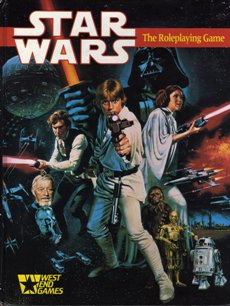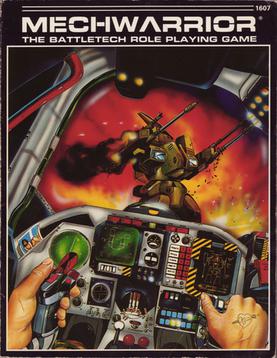West End Games (WEG) was a company that made board, role-playing, and war games. It was founded by Daniel Scott Palter in 1974 in New York City, but later moved to Honesdale, Pennsylvania. Its product lines included Star Wars, Paranoia, Torg, DC Universe, and Junta.

Torg is a cinematic cross-genre tabletop role-playing game created by Greg Gorden and Bill Slavicsek, with art by Daniel Horne. It was first published by West End Games (WEG) in 1990. Game resolution uses a single twenty-sided die, drama cards and a logarithmic results table, which later formed the basis for WEG's 1992 sci-fi RPG Shatterzone and 1994 universal RPG Masterbook. WEG produced over fifty supplements, novels and comics for the first edition. A revised and expanded core rule book was produced in 2005, with a single adventure. After WEG closed in 2010, Torg was sold to Ulisses Spiele, who, after a successful crowdfunding campaign, published a new edition called Torg: Eternity in 2018.

The Bard's Tale II: The Destiny Knight is a fantasy role-playing video game created by Interplay Productions in 1986. It is the first sequel to The Bard's Tale, and the last game of the series that was designed and programmed by Michael Cranford.

Star Wars: The Roleplaying Game is a role-playing game set in the Star Wars universe, written and published by West End Games (WEG) between 1987 and 1999. The game system was slightly modified and rereleased in 2004 as D6 Space, which used a generic space opera setting. An unrelated Star Wars RPG was published by Wizards of the Coast from 2000 to 2010. Since 2012 the official Star Wars role-playing game is another unrelated game, published by Fantasy Flight Games.
Nigel D. Findley was a Canadian game designer, editor, and an author of science fiction and fantasy novels and role-playing games (RPGs).

MechWarrior is a set of role-playing game rules published by FASA Corporation in 1986 that were designed to be used with FASA's previously published mecha wargame BattleTech.

The Primal Order, or TPO, is a religion-based fantasy roleplaying game supplement. Of particular note, TPO was the first work published by Wizards of the Coast and its president, Peter Adkison. Through TPO, Wizards of the Coast introduced the "Capsystem" concept, enabling gamemasters to seamlessly integrate TPO and future Capsystem titles into other role-playing games.

Sandman: Map of Halaal is a role-playing game (RPG) published by Pacesetter Ltd in 1985 that was marketed as an "Instant Adventure" requiring no preparation by the players — their characters awake with amnesia and must struggle to discover who they are. Map of Halaal was the first in a planned trilogy of Sandman adventures, but Pacesetter went out of business before the rest of the series could be published.

Barony, subtitled "Fantasy Role-Play", is a role-playing game published by Better Games in 1990.

Creatures of Orrorsh is a supplement published by West End Games in 1992 for the multi-genre role-playing game Torg.

Dungeon Planner Set 2: Nightmare in Blackmarsh is an adventure published by Games Workshop in 1984 for use with fantasy role-playing games.
The Stormrider is an adventure published by Lion Rampant in 1989 for the fantasy role-playing game Ars Magica.

Mercurial is an adventure published by FASA in 1989 for the near-future cyberpunk role-playing game Shadowrun.

The Living Land is a cross-genre tabletop role-playing supplement, written by Christopher Kubasik, with cover art by Daniel Horne and interior illustrations by Jeff Menges, and published by West End Games in 1990. The first sourcebook published for Torg, detailing the mist-filled jungle and its primitive dinosaur people that had invaded two areas of North America. It received mixed reviews in game periodicals including Games International, White Wolf, and Dragon. A rewritten version was published in 2018 by Ulisses Spiele for Torg Eternity.

The Nile Empire is a supplement published by West End Games in 1990 for the cross-genre role-playing game Torg. A second edition was published for the Torg Eternity RPG in 2020.

Gorgoroth is a supplement published by Iron Crown Enterprises (ICE) in 1990 for the fantasy role-playing game Middle-earth Role Playing (MERP), which is itself based on the works of J.R.R. Tolkien.

The Possibility Chalice is the second of three adventures in the Relics of Power trilogy published by West End Games (WEG) in 1990 for the cross-genre role-playing game Torg.

Kanawa Land Vehicles, subtitled "Wheels for the Possibility Wars", is a supplement published by West End Games (WEG) in 1992 for the multi-genre role-playing game Torg.

Indiana Jones Judge's Survival Pack is a supplement published by TSR in 1985 for the action-adventure role-playing game The Adventures of Indiana Jones Role-Playing Game, itself based on the Indiana Jones movie franchise.

















